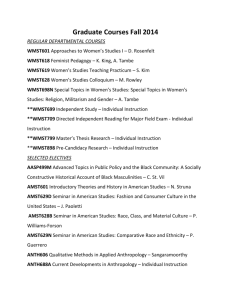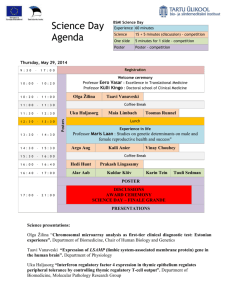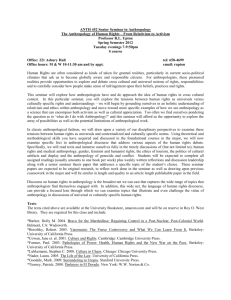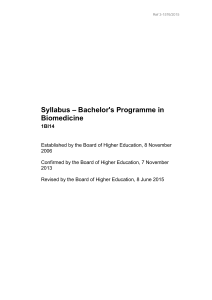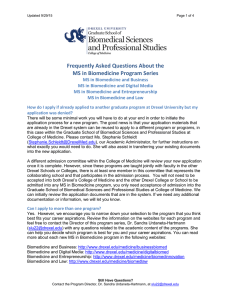It is the working hypothesis of this seminar that biomedicine as a
advertisement
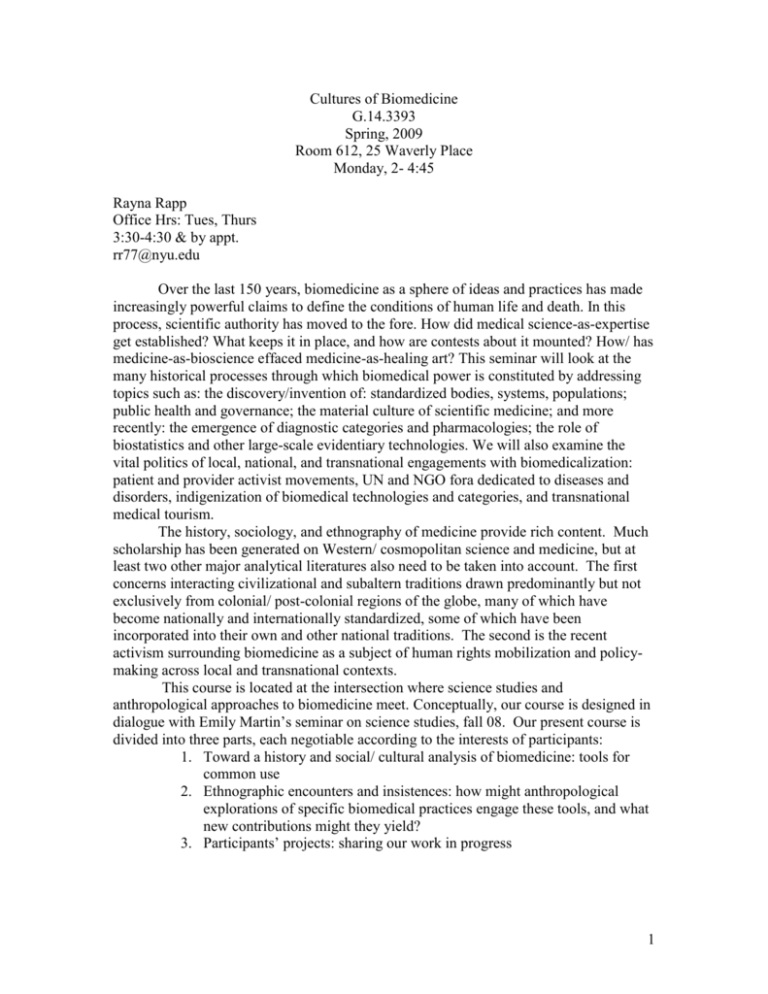
Cultures of Biomedicine G.14.3393 Spring, 2009 Room 612, 25 Waverly Place Monday, 2- 4:45 Rayna Rapp Office Hrs: Tues, Thurs 3:30-4:30 & by appt. rr77@nyu.edu Over the last 150 years, biomedicine as a sphere of ideas and practices has made increasingly powerful claims to define the conditions of human life and death. In this process, scientific authority has moved to the fore. How did medical science-as-expertise get established? What keeps it in place, and how are contests about it mounted? How/ has medicine-as-bioscience effaced medicine-as-healing art? This seminar will look at the many historical processes through which biomedical power is constituted by addressing topics such as: the discovery/invention of: standardized bodies, systems, populations; public health and governance; the material culture of scientific medicine; and more recently: the emergence of diagnostic categories and pharmacologies; the role of biostatistics and other large-scale evidentiary technologies. We will also examine the vital politics of local, national, and transnational engagements with biomedicalization: patient and provider activist movements, UN and NGO fora dedicated to diseases and disorders, indigenization of biomedical technologies and categories, and transnational medical tourism. The history, sociology, and ethnography of medicine provide rich content. Much scholarship has been generated on Western/ cosmopolitan science and medicine, but at least two other major analytical literatures also need to be taken into account. The first concerns interacting civilizational and subaltern traditions drawn predominantly but not exclusively from colonial/ post-colonial regions of the globe, many of which have become nationally and internationally standardized, some of which have been incorporated into their own and other national traditions. The second is the recent activism surrounding biomedicine as a subject of human rights mobilization and policymaking across local and transnational contexts. This course is located at the intersection where science studies and anthropological approaches to biomedicine meet. Conceptually, our course is designed in dialogue with Emily Martin’s seminar on science studies, fall 08. Our present course is divided into three parts, each negotiable according to the interests of participants: 1. Toward a history and social/ cultural analysis of biomedicine: tools for common use 2. Ethnographic encounters and insistences: how might anthropological explorations of specific biomedical practices engage these tools, and what new contributions might they yield? 3. Participants’ projects: sharing our work in progress 1 After our first course meeting, I’ll order more books. Our readings are found in three places: Books for purchase at the NYU bookstore: John Pickstone, 2002. Ways of Knowing. Univ. Manchester Press. Roy Porter, Blood & Guts 2002. Penguin. Annemarie Mol, 2002. The Body Multiple. Duke UP. Monica Konrad, 2005 Narrating the New Predictive Genetics. Cambridge UP. Joao Biehl, 2007. Will to Live. Didier Fassin, 2007. When Bodies Remember. Univ. California Press. Articles appear either in the e-database/ journals section of the library or are found in downloadable form on our Blackboard site. Week 1 Introduction Jan. 26 Classic background reviews: Sarah Franklin, 1995. “”Science as Culture, Cultures of Science” Annual Review of Anthropology 24:163-84. David Hess, 1997. “If You’re Thinking of Living in STS: a guide for the Perplexed” in Gary Downey & Joseph Dumit, eds. Cyborgs & Citadels: Anthropological Interventions in Emerging Sciences and Technologies. Santa Fe: School of American Research Press, pp. 143-64. BB Emily Martin, 1998. “Anthropology and the Cultural Study of Science”. Science, Technology, and Human Values 23: 2-44. Sharon Traweek, 1993. “An Introduction to Cultural and Social Studies of Sciences and Technologies”. Culture, Medicine & Psychiatry 17: 3-25. Week 2 Histories 2 Feb John Pickstone, Ways of Knowing. Adele Clarke et al, 2003. “Biomedicalization: Technosicientific Transformations of Health, Illness, and US Biomedicine”, American Sociological Review 68: 161194. BB Robert Cook-Deagan & Michael McGeary, 2006. “The Jewel in the Federal Crown? History, Politics, and the NIH” in Stevens, Rosenberg, and Burns, eds. History and Health Policy in the US. Rutgers UP, pp. 176-201. BB Week 3 Toolkits for opening up biomedicine 9 Feb AnneMarie Mol, The Body Multiple Duke, 2002 President’s Day, no classes 16 Feb 09 Please read or review Roy Porter, Blood & Guts Week 4 Numbers and Bodies Feb 23 Classics: Ian Hacking “How Should We Do the History of Statistics?” Ideology & Consciousness 1976 BB 2 Talal Asad , 1994. “Ethnographic Representation, Statistics and Modern Power”. Social Research 61: 55-89.BB Theodore Porter, 2002, “Life Insurance, Medical Testing, and the Management of Mortality” in Lorraine Daston, ed. Biographies of Scientific Objects. Univ. Chicago, pp. 226-246. BB Thinking with numbers: Robert Aronowitz, “Situating Health Risks” in Stevens, Rosenberg, and Burns, eds. History and Health Policy in the US. Rutgers UP, pp. 153-175. BB Foucault, Health & Medicine, Alan Petersen, “Risk, governance and the New Public Health”, pp. 189-206. BB Susan Greenhalgh, 2003. “Planned Births, Unplanned Persons: ‘Population’ in the Making of Chinese Modernity”. American Ethnologist 30 (2): 196-215. Wendy Chavkin, 2008. “Biology and Destiny” in Carolyn M. Elliott. Ed. Global Empowerment of Women. (NY: Routledge), pp. 46-54 BB Week 5 Generating diagnostic categories in context: 2 March Alan Young, “History, Hystery and Psychiatric Styles of Reasoning.” In Living and working with the New Medical Technologies, BB Adriana Petryna, 2007. “Clinical Trials Offshored: On Private Sector Science and Public Health”. Biosocieties 2: 21-40. Nicky Hart, 2008. “Making the Grade: The Gender Gap, ADHD, and the Medicalization of Boyhood” in Rosenfeld & Faircloth, eds. Medicalizated Masculinities. Temple UP: 132-164. BB Margaret Lock et al, 2007. “Susceptibility Genes and the Question of Embodied Identity”. MAQ 21 (3) 256-276. Week 6 Redefining Epidemics I 9 March Didier Fassin, When Bodies Remember Spring Break: 16 March Week 7 Redefining Epidemics II 30 March Joao Biehl, Will to Live Week 8 Redefining Epidemics II 6 April Psychiatrization Andrew Lakoff, 2004. "The Anxieties of Globalization: Antidepressant Sales and Economic Crisis in Argentina," Social Studies of Science, 34 (2): 247-269. Nikolas Rose, 2006. “Disorders Without Borders? The Expanding Scope of Psychiatric Practice” Biosocieties 1 (4) 465-484. “Neuro-Forum” in Biosocieties 2006 1 (1): 97-132 Emily Martin, “The Pharmaceutical Person” Biosocieties 2006 1 (3):273-287. Week 9 Redefining Epidemics III 13 April 3 According to seminar participant’s interest Week 10 Redefining Epidemics IV 20 April According to seminar participant’s interest Week 11 Technology redefining the life span 20 April Monica Konrad, Narrating the New Predictive Genetics Sherine Hamdy, 2008. “When the State and Your Kidneys Fail” American Ethnologist 35 (4): 553-569. Sharon Kaufman, 2000. “In the Shadow of ‘Death with Dignity’: Medicine and Cultural Quandaries of the Vegetative State”. Am. Anthropologist 102 (1): 69-83. Marcia Inhorn, 2006. “’He Won’t Be My Son’: Middle Eastern Muslim Men’s Discourses of Adoption and Gamete Donation” Medical Anthropology Quarterly 20 (1): 94-120. Week 12 Humanitarian/ HR medicine 27 April Classics: Rene Fox, 1995 “Med Humanitarianism and HR: Reflections on Doctors Without Borders and Doctors of the World”. Social Science & Medicine 41 (12) 16071616. Ethnographic encounters: Didier Fassin, 2007 “Humanitarianism as a Politics of Life”. Public Culture 19 (3) 499-520. Miriam Ticktin “Where ethics and politics meet: the violence of humanitarianism in France” 2006 American Ethnologist 33 (1) 33-49. Bettina Shell-Duncan, 2008. “From Health to Human Rights: Female Genital Cutting and the Politics of Intervention” American Anthropol. 110 (2): 225-236. Vincanne Adams, Thomas E Novotny, Hannah Leslie, 2008. “Global Health Diplomacy”. Medical Anthropology 27 (4): 315-323. Weeks 13 & 14: Student Seminar Presentations 4 May, double session if schedules permit Course requirements and evaluation: Keep up with assigned reading, attend all classes prepared for discussion Sign up twice during the semester to prepare and present original questions drawn from assigned weekly readings. These will be used to begin class discussion. Research and write an original paper, with topic approval, 25-30 pages, due Monday 11 May. Early drafts will be presented in class, 4 May 4

